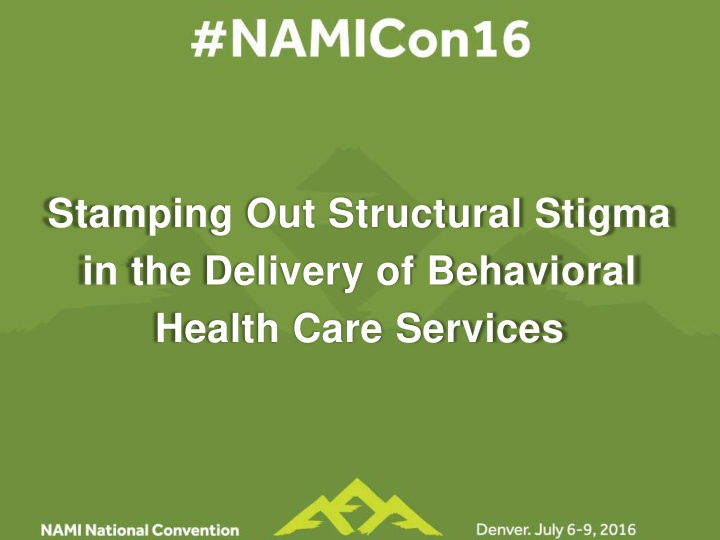



Stamping Out Structural Stigma in the Delivery of Behavioral Health Care Services
Presenters • Clarence Jordan, VP, Wellness & Recovery, Beacon Health Options • Lisa Kugler, Psy.D., VP of Clinical Services, Value Behavioral Health of PA • Suzanne Klaus, Manager, Prevention, Education & Outreach, Value Behavioral Health of PA • Lauren Gallaher, Certified Peer Specialist
Who Are We?
Goals for Today’s Seminar • To increase knowledge of Structural Stigma • To understand distinction between policies/procedures that support structural stigma and those that are recovery oriented • To increase knowledge regarding how to incorporate recovery principles into a corporate culture
Types of Stigma: Structural Personal Public Intersecting
The Past… • Previously much of healthcare was run through a medical model of care • VBH-PA was no different • In 2011, VBH-PA was cited for not having a recovery culture.
The Past… To address this deficiency, VBH-PA had to work on changing a whole culture. But to get there we had to know where we were going so…
[ Recovery ] So what is recovery?
Recovery Definition According to SAMSHA (2012) Recovery is a process of change through which individuals improve their health and wellness, live a self-directed life, and strive to reach their full potential.
15 Essential Elements of Recovery 1.) Person-centered 2.) Inclusive of family and other ally involvement 3.) Individualized and comprehensive services across the lifespan 4.) Systems anchored in the community 5.) Continuity of care (pretreatment, treatment, continuing care, and recovery support)
15 Essential Elements of Recovery (Con.) 6.) Partnership/consultant relationship 7.) Strengths-based (emphasis on individual strengths, assets, and resilience) 8.) Culturally responsive 9.) Responsive to personal belief systems 10.) Committed to peer recovery support services
15 Essential Elements of Recovery (Con.) 11.) Inclusive of the voices of individuals in recovery and their families 12.) Integrated services 13.) System-wide education and training 14.) Outcomes-driven 15.) Adequately and flexibly financed
What does this mean had to change? Everything!
Why? It was a whole culture shift that went from…
To….
So what exactly had to change? • Language • Templates • Requests for Authorization Forms • Rounds • Focus of Reviews • Longitudinal Care Management Techniques • Sharing of Member’s Successes
Recovery Language Grid Language that Promotes Language Not Reflecting Acceptance, Respect & Comments Recovery Uniqueness Avoid equating the person’s Max is mentally ill Max has a mental illness identity with a diagnosis. Max is Max is a bipolar Max has schizophrenia a person first and foremost, and he also happens to have bipolar Max is… Max has been diagnosed with disorder. bipolar disorder Very often there is no need to Max is a person with… mention a diagnosis at all It is sometimes helpful to use the term “a person diagnosed with,” because it shifts the responsibility for the diagnosis to the person making it, leaving the individual the freedom to accept it or not.
Recovery Language Grid (Con.) Language that Promotes Language Not Reflecting Acceptance, Respect & Comments Recovery Uniqueness Sarah is decompensating Sarah is having a rough time Describe what it looks like uniquely to that individual — that information Sarah is experiencing… is more useful than a generalization Avoid sensationalizing a setback into something huge Mathew is manipulative Mathew is trying really hard to get Take the blame out of the his needs met the way that he statement knows Recognize that the person is trying Mathew may need to work on to get a need met the best way more effective ways of getting his they know how needs met Kyle is choosing not to… Marty is non-compliant Describe what it looks like uniquely Kyle would rather… to that individual — that information Kyle is looking for other options is more useful than a generalization. Is the member even in agreement with the plan of care or do they not see a need for this plan of care?
Recovery Language Grid (Con.) Language that Promotes Language Not Reflecting Acceptance, Respect & Comments Recovery Uniqueness Joan chooses not to… Joan is resistant to treatment Describe what it looks like uniquely to that individual — that information Joan prefers not to… is more useful than a generalization Joan is unsure about… Remove the blame from the Joan is not engaged in… statement Allie is really good at… Allie is high functioning Describe what it looks like uniquely to that individual — that information is more useful As taken from: Recovery Language, http://www.dshs.wa.gov/pdf/dbhr/mh/MH RecoveryLanguage08022010.pdf
People may forget what you said People may forget what you did But people never forget how you made them feel – Maya Angelou
Stamp Out Stigma • SOS Initiative • Resiliency Training • Recovery Oriented Language Training • Sponsorships that support SOS
Stamp Out Stigma
Stamp Out Stigma
Inclusion of Families and Members • Family Advisory Committee • Quality Management Committee • Complaints and Grievances • Clinical Advisory Committee • Forum Planning Committees • Transition Age Advisor Group (TAAG)
Outreach, Recovery & Wellness • Three Annual Recovery Forums: • Family Forum • Adult Recovery Forum • Acknowledging the Journey Forum • Attendance and participation in local community recovery events • Local and regional stakeholders meetings • Transition Age Advisor Group (TAAG)
Adult Recovery Forum Planning Committee
Leadership In Recovery Award Winner
Annual T.A.A.G. Picnic
Questions?
Recommend
More recommend